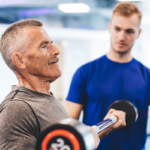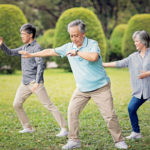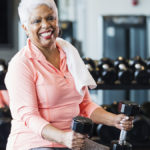
Shirley Eichenberger-Archer, JD, MA
Shirley Eichenberger-Archer, JD, MA
Article Archive
How are you integrating the popular interest in longevity with your marketing and education about the benefits of fitness training? And, are you highlighting the specific advantages of training with a professional versus simply having an active lifestyle? For example, are you sharing information about how programmed exercise training increases longevity, boosts brain fitness, prevents…
Researchers examine strategies to boost exercise participation across three club types. Building community and increasing engagement are key to client retention. Norwegian School of Sports Sciences researchers in Oslo, Norway, surveyed members from three types of facilities—boutique studios, multi-purpose clubs and low-cost fitness-only gyms—to find targeted strategies to improve participation, exercise adherence and retention. They…
Study shows reduced feelings of depression after even one training bout. Fitness pros are familiar with the mood lifting benefits of aerobic training. New research shows that a single session of resistance training can improve mood comparable with a quiet rest break. University of Limerick researchers in Limerick, Ireland, examined whether a single session of…
Research shows users of a fitness app have modest, lasting gains. In a 24-month study of more than half a million Canadian fitness-app users, researchers found that offering small daily financial rewards—just 4 cents per day—led to about a 40% increase in activity among less active users. The gains were sustained over 2 years. Highly…
Losing cognitive function is not inevitable–exercise matters. Exercise is among the most important lifestyle strategies to help slow or prevent cognitive decline. In the United States, about one in five older adults have mild cognitive impairment and one in nine have dementia, as noted in Alzheimer’s & Dementia (2021; doi: 10.1002/alz.12362). Large-scale studies now show…
Research supports music’s role in performance, recovery and well-being. Fit pros should remember that music is more than background sound—it’s a proven performance tool. Research shows that music can: 1. Boost motivation and focus. Music elevates mood and helps athletes reach a “flow” state of deep concentration. 2. Enhance performance. Studies link music tempo and…
Young male exercisers may want to rethink the ice bath after training. A new study in Medicine & Science in Sports & Exercise (2025; doi: 10.1249/MSS.0000000000003723) shows that cold-water immersion after strength training may actually slow muscle recovery. Twelve active young men performed a resistance workout and then cooled one leg in 8°C water while…
Study compares aerobic, strength and combination training on sleep quality. If you have an older client struggling with sleep issues, consider recommending strength training. A study published in Family Medicine & Community Health (2025; doi: 10.1136/fmch-2024-003056) found that resistance training gives the most sleep benefits for older adults with insomnia, outperforming aerobic or combination training.…
Regardless of pace, walking for longer periods helps people fight low back pain. While a quicker pace supports longevity and reduces risks of heart disease, new evidence suggests that longer walking times, regardless of speed, may offer better protection against low back pain, highlighting the importance of providing individualized advice to meet each client’s specific…
A faster pace can help walkers live longer. Do you use fast walking in warm-ups or interval training? If so, you’re already helping clients build a skill that boosts longevity. Brisk walking for 15 minutes a day is linked to longer life, even for older adults and those with health or income challenges. The study,…
Research review notes more than 300 million downloads. Have you asked your clients whether they are using a meditation app? According to a new review in American Psychologist (2025; doi: 10.1037/amp0001576), smartphone meditation apps have been downloaded more than 300 million times, reaching users who typically may not have access to in-person meditation teachers or…
Research reveals impact of brief mindfulness training on exercise motivation. Adding a few mindful moments at the end of your next training session may be a simple way to strengthen client motivation. In a study reported in Mental Health and Physical Activity (2025; doi: 10.1016/j.mhpa.2025.100680), University of Bath researchers enrolled 109 adults, provided them with…
New research shows planned workouts outperform daily activity for longevity. Fit pros can assure clients that paying for individualized training is a solid investment in future health and vitality. A new review from Tohoku University researchers in Sendai City, Japan, finds that structured, repetitive exercise routines like strength training, endurance or mixed-modality programs, can effectively…
Study finds compelling reasons to start or increase a mid-life fitness program. Looking for new ways to motivate your mid-life clients? Let them know that regular physical activity during midlife may help prevent Alzheimer’s disease. A new study in Alzheimer’s & Dementia reports that increasing physical activity levels between ages 45 and 65 can slow…
New meta-analysis shows major benefits for clients with diabetes and obesity. A new research review confirms what many fitness pros know – resistance training delivers measurable health improvements, especially for clients who are overweight, obese or have diabetes. An international research team found that consistent strength training improved insulin sensitivity, blood glucose, blood pressure, blood…
New clinical trial supports myofascial release to improve movement performance. Keep using foam rollers, dynamic stretches and mobility tools to stimulate fascia. New research confirms the performance-enhancing effects of myofascial release (MFR) when added to a flexibility, muscular endurance and balance program. This single-blind randomized controlled trial studied healthy adults aged 18–35 years who followed…
Fitness pros have long understood the benefits of mind-body exercise; now, new research highlights Tai Chi as a particularly effective, non-pharmaceutical strategy that may help clients combat anxiety and stress. The study, published in Medicine & Science in Sports & Exercise suggests that Tai Chi practice alters brain functioning in ways that improve emotion regulation…
Study identifies mechanisms for how physical activity may prevent Alzheimer’s disease. New research reveals why exercise protects brain health. It activates specific brain cells in the hippocampus, the brain’s center for memory and learning. Scientists from Mass General Brigham and SUNY Upstate Medical University used advanced techniques to identify the brain cell types most responsive…
Study shows link between short between-game rest periods and increased injury risk. Here’s an important reminder for trainers who work with competitive athletes: short rest equals higher injury risk. NFL players were significantly more likely to suffer a serious knee injury—specifically tears of the knee extensor mechanism—after shorter rest periods between games, according to University…
Research shows connection between training timing, consistency and positive results. For older adults, regular morning physical activity may lead to better heart-lung function and walking efficiency, according to a study of about 800 older adults with an average age of 76, reported in Medicine & Science in Sports & Exercise. “While we’ve long known that…


















